#a history of delta igbo people
Explore tagged Tumblr posts
Text

CULTURE SUMMARY: IGBO
By IFI AMADIUME
ETHNONYMS
Ala Igbo, Ani Igbo, Ibo, Ndi Igbo.
IDENTIFICATION AND LOCATION
Igbo is the language spoken in Ala Igbo or Ani Igbo (Igboland) by the people who are collectively referred to as “Ndi Igbo”; their community is known as “Olu no Igbo” (“those in the lowlands and uplands”). Before European colonialism, the Igbo-speaking peoples, who shared similarities in culture, lived in localized communities and were not unified under a single cultural identity or political framework, although unifying processes were present via expansion, ritual subordination, intermarriage, trade, cultural exchange, migration, war, and conquest. Villages and village groups were generally identified by distinct names of their ancestral founders or by specific names such as Umuleri, Nri, Ogidi, Nnobi, Orlu, Ngwa, Ezza, and Ohaffia.
There are several theories concerning the etymology of the word “Igbo” (wrongly spelled “Ibo” by British colonialists). Eighteenth-century texts had the word as “Heebo” or “Eboe,” which was thought to be a corruption of “Hebrew.” “Igbo” is commonly presumed to mean “the people.” The root - bo is judged to be of Sudanic origin; some scholars think that the word is derived from the verb gboo and therefore has connotations of “to protect,” “to shelter,” or “to prevent”—hence the notion of a protected people or a community of peace. According to other theorists, it may also be traced to the Igala, among whom onigbo is the word for “slave,” oni meaning “people.”
Igbo-speaking peoples can be divided into five geographically based subcultures: northern Igbo, southern Igbo, western Igbo, eastern Igbo, and northeastern Igbo. Each of these five can be further divided into subgroups based on specific locations and names. The northern or Onitsha Igbo are divided into the Nri-Awka of Onitsha and Awka; the Enugu of Nsukka, Udi, Awgu, and Okigwe; and those of the Onitsha town. The southern or Owerri Igbo are divided into the Isu-Ama of Okigwe, Orlu, and Owerri; the Oratta-Ikwerri of Owerri and Ahoada; the Ohuhu-Ngwa of Aba and Bende; and the Isu-Item of Bende and Okigwe. The western Igbo (Ndi Anioma, as they like to call themselves) are divided into the northern Ika of Ogwashi Uku and Agbor; the southern Ika or Kwale of Kwale; and the Riverrain of Ogwashi Uku, Onitsha, Owerri, and Ahoada. The eastern or Cross River Igbo are divided into the Ada (or Edda) of Afikpo, the Abam-Ohaffia of Bende and Okigwe, and the Aro of Aro. The northeastern Igbo include the Ogu Uku of Abakaliki and Afikpo.

Today Igbo-speaking individuals live all over Nigeria and in diverse countries of the world. As a people, however, the Igbo are located on both sides of the River Niger and occupy most of southeastern Nigeria. The area, measuring over 41,000 square kilometers, includes the old provinces of Onitsha, Owerri, East Rivers, Southeast Benin, West Ogoja, and Northeast Warri. In contemporary Nigerian history, the Igbo have claimed all these areas as the protectorate of the “Niger Districts.” Thus began the process of wider unification and incorporation into wider political and administrative units. Presently, they constitute the entire Enugu State, Anambra State, Abia State, Imo State, and the Ahoada area of Rivers State; Igbo-speaking people west of the Niger are inhabitants of the Asaba, Ika, and Agbo areas of Delta State.

#african#afrakan#kemetic dreams#africans#brownskin#brown skin#afrakans#african culture#igbos#Ndi Igbo#Ani Igbo#Ala Igbo#Umuleri#Nri#Ogidi#Nnobi#Orlu#Ezza#Ohaffia#nigerian#niger#niger delta
36 notes
·
View notes
Text

The Igbuzo (Ibusa) Kingdom:: Tracing the Roots of a Brave Igbo Community in Delta State, Nigeria"
Igbuzo, also known as Ibusa, is a vibrant Igbo community nestled in Delta State, Nigeria. Its roots can be traced back to around 1450 when waves of Igbo migrants embarked on a journey westward, ultimately leading to the formation of Igbuzo.
The name "Ibusa" is derived from "Igbo bi n'ụzọ," meaning "Igbos that live by the wayside" or "Were you the first to settle here?" This moniker was bestowed upon them by neighboring communities such as Ogwashi-Uku, Asaba, Oko, Ilah, and Okpanam, as well as European missionaries who struggled to pronounce the community's original name.
Historians believe that a group of settlers who embarked on a journey from Benin alongside Ezechima, heading eastward, may have found their final settlement in Igbuzo. It is speculated that these settlers, either due to illness or a lack of interest in continuing their journey, assimilated into the existing Umejei and Edini groups in Igbuzo.
Ibusa comprises two distinct units: the Umejei and Ogboli settlements. According to oral history, Umejei Nwa Eze Isu, the prince of Isu, was involved in a wrestling bout that resulted in the death of his opponent. Traditionally, this act was considered an abomination punishable by death. However, Umejei's father, the king of Isu, commuted his son's sentence, and Umejei was exiled with a gourd given to him by his father. He was instructed to settle wherever the gourd dropped, leading him to establish Igbuzo at the present site of Ani-Oshe in Omeze.
In another tale, Odaigbo of Nshi (Nri) had relations with one of his father's wives, which usually carried a mandatory death sentence. However, Eze Nshi spared Odaigbo's life and instead exiled him, accompanied by his father, mother, and younger brother, Edini. Each of them carried a pot and charms, instructed by Eze Nshi to settle wherever the pot fell. Edini's pot landed at Ani-Nshi (Nri) Ogboli in Ibusa, while Odaigbo's pot dropped at the current site of Ogwashi-Uku, where he settled. The groups of Edini and Umejei eventually merged to form Ibusa, with the Ogboli community becoming part of the larger Nri (Nshi) community.
Ibusa is renowned among the Igbo and Anioma people of Delta State for their courageous spirit, often described as "Isu (Igbuzo) fu ogu ju nni," meaning "Ibusa people who refuse food to fight wars." This statement exemplifies their bravery in times of conflict. Researchers are currently delving into the history of wars fought by the Igbuzo people, particularly in the homes of their kinsmen in Nnewi, Anambra State, to uncover any historical connections between the two communities.
43 notes
·
View notes
Text
The Ekumeku Movement Explained
Igbo Culture
How this Igbo group resisted British domination for 30 years During Britain’s colonisation of Nigeria, one of the most prolonged and drawn-out conflicts was against the Ekumeku. A movement fought by the Anioma, an Igbo subgroup, and their neighbouring Igbo allies. So, what sparked the beginning of the movement? As the British looked to complete their colonial domination of the people within…
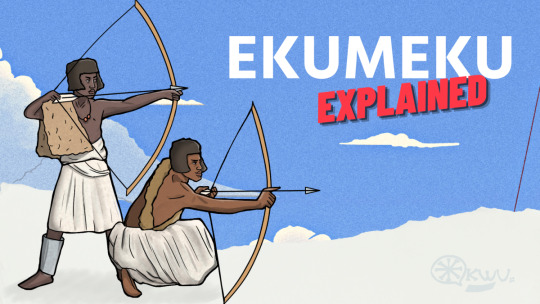
View On WordPress
#30 years ekumeku#a history of delta igbo people#adiele afigbo#akwa ocha#ANIOMA#British native courts#colonialism in nigeria#delta igbo#delta igbo history#EKUMEKU#EKUMEKU WARRIORS#igbo#igbo anime#igbo culture#igbo essays#igbo history#igbo nigerian history#igbo resistance to colonialism#igbo wardfare#Ika Igbo#native courts#nigeria#ogwashi-ukwu#pan igbo#pan-igbo studies
13 notes
·
View notes
Text
WEST AFRICAN RESOURCES
The Anthropological Masterlist is HERE.
West African is an African region that spans the western part of the continent.
AGNIS ─ “The Agnis, or Anyi, people are an African people. They are native to the Ivory Coast.” ─ Anyi Information
AKAN ─ “The Akan people are an African people. They are native to Ghana and the Ivory Coast.” ─ Pre-Colonial History of Ghana ─ Modern-Day Akan ─ Akan Dictionary
ANNANG ─ “The Annang, or Anaang, people are an African people. They are native to southern Nigeria.” ─ Annang Dictionary
ASHANTI ─ “The Ashanti, or Asante, people are an African people. They are native to the Ashanti region in Ghana.” ─ Ashanti Information ─ Ashanti Culture ─ Ashanti History
BAMBARA ─ “The Bambara people are an African people. They are native to West Africa.” ─ Bambara Art ─ Bambara Language (in French)
BASSARI ─ “The Bassari people are an African people. They are native to the Kédougou region of Senegal.” ─ Bassari Language (in French)
EWE ─ “The Ewe people are an African people. They are native to the coastal areas of West Africa.” ─ Ewe Information ─ The Anlo-Ewe People ─ The Adze in Ewe Mythology
FON ─ “The Fon, or Dahomey, people are an African people. They are native to south Benin and southwest Togo and Nigeria.” ─ The Dahomey Amazons
IBIBIO ─ “The Ibibio people are an African people. They are native to the coasts of southern Nigeria.” ─ Ibibio Language Resources ─ Ibibio Masks
IGBO ─ "The Igbo, or Ibo, people are an African people. They are native to Nigeria.” ─ Igbo Culture ─ Igbo Dictionary
ISOKO ─ “The Isoko people are an African people. They are native to the Isoko region in Nigeria.” ─ Isoko Information ─ Isoko Culture and History ─ Isoko Dictionary
KONGO ─ “The Kongo people are an African people. They are native to the Atlantic coast of central Africa.” ─ Kongo Language Resources ─ Kongo Dictionary
KONO ─ “The Kono people are an African people. They are native to the Kono District in eastern Sierra Leone.” ─ Kono Culture and Rituals
NIGERIAN ─ “The Nigerian people are an African people that share the Nigerian culture. They are native to Nigeria.” ─ Nigerian Information ─ Colonial Nigeria
SERER ─ “The Serer, or Seereer, people are an African people. They are native to Senegal.” ─ Serer Information ─ Serer Language
TALLENSI ─ “The Tallensi, or Talensi, people are an African people. They are native to northern Ghana.” ─ Tallensi Culture ─ Tallensi Development and Culture
URHOBO ─ “The Urhobo people are an African people. They are native to the Niger Delta in Nigeria.” ─ Ughelli Kingdom Information ─ Urhobo Dictionary
VODUN ─ “Vodun, or Vodon, is a West African religion. It originates in West Africa.” ─ Christians and Vodun
YORUBA ─ “Yoruba, or Isese, is a West African religion. It originates in southwestern Nigeria.” ─ The Yoruba People ─ Yoruba Culture (in Spanish) ─ Yoruba Mythology
#resources#agnis#akan#annang#ashanti#bambara#bassari#ewe#fon#ibibio#igbo#isoko#kongo#kono#nigerian#serer#tallensi#vodun#yoruba#west african
129 notes
·
View notes
Text
Separatist and irredentist movements in the world
Niger Delta
Proposed state: Niger Delta Republic
Region: Abia State, Akwa Ibon State, Bayelsa State, Cross River State, Delta State, Edo State, Imo State, Ondo State, and Rivers State, Nigeria
Ethnic group: Anaang, Edo, Efik, Esan, Ibibio, Igbo, Ijaw, Isoko, Itsekiri, Obolo, Ogoni, Örö, Urhobo, Yoruba
Goal: independence
Date: 1966
Political parties: -
Militant organizations: Movement for the Emancipation of the Niger Delta (MEND), Niger Delta Avengers (NDA), Niger Delta Greenland Justice Mandate (NDGJM), Niger Delta Vigilante (NDV)
Current status: war
History
10th century-1911 - Kingdom of Nri
16th century - Portuguese exploration
1690-1902 - Aro Confederacy
1884-1960 - British protectorate
1960 - Nigerian independence
1966 - declaration of independence
1998 - Kaiama Declaration
2000 - foundation of the Niger Delta Development Commission (NDDC)
2003 - the NDV is formed
2004 - foundation of the MEND
2016 - creation of the NDA and NDGJM
The Kingdom of Nri was formed in the 10th century in the Niger Delta. In the 16th century, Portuguese explorers began to trade with the peoples of southern Nigeria, which marked the beginning of the Atlantic slave trade.
Between 1690 and 1902, Aro people in present-day southeastern Nigeria joined to form the Aro Confederacy.
In 1884, the United Kingdom colonized modern-day Nigeria, including the Niger Delta. In 1960, Nigeria obtained its independence.
Six years later, Isaac Adaka Boro declared the secession of the Niger Delta Republic. During the 1990s, local communities organized oil protests due to the lack of economic development in the region despite the wealth created by oil and due to the destruction of their habitat by foreign oil companies. This was crystallized in the Kaima Declaration.

A few years later, several government and private initiatives to develop the Niger Delta region were introduced, including the Niger Delta Development Commission. In 2008, the MEND declared the launch of an oil war against pipelines and oil-production facilities, as well as against the Nigerian Armed Forces, which continues until the present day.
Niger Delta people
The Niger Delta is inhabited by 31 million people who belong to more than 40 ethnic groups, including the Anaang, Edo, Efik, Esan, Ibibio, Igbo, Ijaw, Isoko, Itsekiri, Obolo, Ogoni, Örö, Urhobo, and Yoruba peoples.
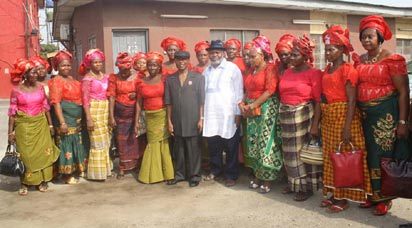
There are around 2.6 million Anaang. They speak Anaang, a Cross River language of the Atlantic-Congo family, and practice Christianity and Paganism.
The Edo number 5 million people and, outside Nigeria, mainly live in Austria, Belgium, France, Germany, Ghana, Italy, Kenya, the Netherlands, Qatar, Senegal, Spain, Turkey, and United Arab Emirates. They speak Edo, an Edoid language of the Atlantic-Congo family, and are predominantly Christian.
There are around 725,600 Efik in Cameroon, Nigeria, and the United States. They speak Efik, a Cross River language, and practice Christianity and their own religion.
The Esan number around 1.5 million people. They speak Esan, an Edoid language, and are mainly Christian.
There are more than 10 million Ibibio in Cameroon, Equatorial Guinea, Ghana, Nigeria, and Trinidad and Tobago. They speak Ibibio, a Cross River language, and practice Christianity.
The Igbo number around 50 million people and mainly live in Australia, Cameroon, Canada, Equatorial Guinea, the Gambia, Ghana, Nigeria, Trinidad and Tobago, the United Kingdom, and the United States. They speak Igbo, an Igboid language of the Atlantic-Congo family, and are Christian but also retain their traditional beliefs.
There are 18 million Ijaw. They speak Ijaw languages, which belong to the Ijoid family, and practice Christianity and traditional African religion.
The Isoko number more than 1 million people and speak Isoko, an Edoid language. They are Christian and practice traditional African religion.
There are around 2.7 million Itsekiri, who speak Itsekiri, a Yoruboid language of the Atlantic-Congo family. They practice Christianity and traditional African religion.
The Obolo, also known as Andoni, speak Obolo, a Cross River language.
There are around 850,000 Ogoni. They speak Ogoni languages, which belong to the Cross River branch, and have their traditional beliefs but also practice Christianity.
The Örö number 1.4 million people and live in Cameroon, the Democratic Republic of the Congo, and Nigeria. They speak Oro, a Cross River language, and practice Christianity and their traditional religion.
There are around 5 million Urhobo. They speak Urhobo, an Edoid language, and practice Christianity and Igbe religion.
The Yoruba number 38 million people and live in Australia, Benin, Burkina Faso, Canada, Côte d’Ivoire, Equatorial Guinea, the Gambia, Ghana, Greece, Ireland, Italy, Liberia, Niger, Nigeria, Sierra Leone, Togo, the United Kingdom, and the United States. They speak Yoruba, a Yoruboid language, and practice Christianity, Islam, and Yoruba religion.
Vocabulary
The vocabulary list is in Igbo (I) and Yoruba (Y), as they are the major native languages of the region.
agha (I) - ogun (Y) - war
Ásụ̀sụ́ Ìgbò (I) - Igbo language
Èdè Yorùbá (Y) - Yoruba language
mkpebi onwe onye (I) - ipinnu ara ẹni (Y) - self-determination
Ṇ́dị́ Ìgbò (I) - Igbo people
nnroonwe (I) - ominira (Y) - independence
Ọ̀hàńjíkọ̀ Ọ̀hànézè Naìjíríyà (I) - Orílẹ̀-èdè Olómìniira Àpapọ̀ Nàìjíríà (Y) - Federal Republic of Nigeria
Ọmọ Káàárọ̀-oòjíire (Y) - Yoruba people
Omu Aro (I) - Aro Confederacy
Ọ̀ràézè Ǹrì (I) - Kingdom of Nri
29 notes
·
View notes
Text
nigeria giant of Africa
Nigeria is often referred to as the “Giant of Africa”, and with good reason. With a population of about 200 million it is the seventh most populous country in the world. It also has the third largest youth population. These young people are doing it all from starting tech businesses, to making music, to writing books. Of course you know that Africa is not a country, but how much do you know about each of the countries that make up the continent? Nigeria Giant of Africa; is a great place to start with.
Now, if you watch the video above, you won’t need to read the details in the rest of this article. The video also features the Afro-House fusion dance record “Ijo (Dance)” by Wyll Diamond.
Nigeria: Basic Facts
Official name: Federal Republic of Nigeria Other names: Giant of Africa Capital: Abuja Independence date: October 1, 1960 Official languages: Nigerian English Currency: Naira (₦) (NGN)
Former colonizer:Great Britain
Country population: 201 million (2019 estimate) Current leadership: President Muhammadu Buhari assumed office May 29, 2015 Major ethnic groups: Hausa, Igbo and Yoruba Major religions followed: Christianity and Islam
Major cities:
Lagos
Kano
Ibadan
Benin City
Port Harcourt
A Brief History
Colonization dates:
August 1861 – Britain annexed Lagos as a Crown Colony with the Lagos Treaty of Cession
January 1, 1901 – Nigeria became a British protectorate, and part of the British Empire
International Organization Memberships:
African Union (founding member)
United Nations
Commonwealth of Nations
OPEC
Tourism
Nigeria: Giant of Africa is a giant in terms of its rainforests and savannah stretches that it features across its terrain.Where the rest of the world is battling to conserve their natural reserve amidst the pollution and exploitation, Nigeria is still giving its best efforts and the results are not disappointing.It is the 6th out of seventeen most biodiverse regions of the world. These forests are home to a diversified flora and fauna. It ranks as the 10th most diversified flora rich region of the world. Apart from this the country ranks third in the richest marine biodiversity genre.
This country is also a hub of ethnicity. It houses some of the oldest and most ethnic tribal and cultural groups of the world. These groups are known for their nature friendly practices and minimalism inspired livelihood. Despite living in the wild, they are one of the most resistant to diseases. Many explorers have visited these groups to learn about their rituals and culture that promote a healthy lifestyle.
The ethnic Education
To ensure that the new generation adults do not forget their roots, children are given training on their ethnicity and culture. They are taught how to live in harmony with nature. Though the training might seem to be a bit harsh, the child grows up to be fully independent adult who has the requisite skills to earn his own livelihood. They are trained in skills such as weaving, carpentry and much more. Though employment rate is challenged throughout the globe and Nigeria being no exception to it, yet indigenous people manage to fill their tummies pertaining to the initial training they have received.
Economics:
20th largest economy as of 2015, worth more than $500 billion and $1 trillion in terms of nominal GDP and purchasing power parity
Wars and conflicts
Ekumeku War (1883–1914) was a series of uprisings against the rising power of the Royal Niger Company of the British Empire in Anioma, the Igbo subgroup in present day Delta State. Although the Ekumeku failed in 1914, but the western Anioma treasure their memory as imperishable legacy. Heroes included DunkwuIsus of Onicha-Olona, NwabuzoIyogolo of Ogwashi-Ukwu, AwunoUgbo, Obi of Akumazi, AgbambuOshue of Igbuzo, Idabor of Issele-Ukwu, OcheiAghaeze of Onicha-Olona, Abuzu of Idumuje-Unor, IdegwuOtokpoike of Ubulu-Ukwu are still remembered in Anioma land. The Ekumeku War is one of the most vigorous campaign of opposition to the British empire and inspired later rebellions such as the Mau Mau of Kenya.
The Anglo–Aro War (1901–1902) was a conflict between the Aro Confederacy in present-day Eastern Nigeria, and the British Empire. Some of the Aro leaders, like OkoroToti, were arrested, tried by tribunals, and hanged. The Aro Confederacy was destroyed and EzeKanuOkoro (king of Arochukwu), went into hiding but was later arrested.
Aba Women’s Riots of November 1929 – Igbo women protested and accused Warrant Chiefs of restricting the role of women in the government.
Civil war (1967–1970) – “The disequilibrium and perceived corruption of the electoral and political process led, in 1966, to back-to-back military coups. In May 1967, the Southern Region declared independence as a state called the Republic of Biafra, under the leadership of Lt. Colonel EmekaOjukwu.[64] The Nigerian Civil War began as the official Nigerian government side attacked Biafra on 6 July 1967 at Garkem. The 30-month war, with a long siege of Biafra and its isolation from trade and supplies, ended in January 1970.[65] Estimates of the number of dead in the former Eastern Region are between 1 and 3 million people, from warfare, disease, and starvation, during the 30-month civil war.”
Some Trivia
Most populous country in Africa (as of 2019)
Seventh most populous country in the world (as of 2019)
Third-largest youth population in the world, after India and China, with more than 90 million of its population under age 18
Over 250 ethnic groups
Nigeria is the 12th largest producer of petroleum in the world and the 8th largest exporter, and has the 10th largest proven reserves. (The country joined OPEC in 1971.) Petroleum plays a large role in the Nigerian economy, accounting for 40% of GDP and 80% of Government earnings.
Prebendalism refers to political systems where elected officials and government workers feel they have a right to a share of government revenues, and use them to benefit their supporters, co-religionists and members of their ethnic group.
6 notes
·
View notes
Photo

An elder in Ila (Illah) holding an abani or eben sword, present-day Delta State. Photographed by Northcote Thomas, c. 1912. MAA Cambridge.
Illah is said to have been founded by Ala[.] […] One of the traditions holds that Ala’s father, lka, came from Nteje (some informants say he came from Nri) and the mother, Ejini, came from lgalaland. […] While at Omorka, the Anam/Nzam people from the east of the Niger frequently harassed the Illah. Through the assistance of a later immigrant, an Edaiken (Oba's first son) from Benin, the Illah contained the Anam's menace. […] The Asaba and Illah traditions seem to indicate a fusion of Igbo and Igala migrants, and emphasize the age-long relationship between them and the Igala in the north and the Igbo in the east.
– Adiele Afigbo (1992). "Groundwork of Igbo history." p. 335.
93 notes
·
View notes
Text
Biafra belongs to Ijaw not Igbos – Asari-Dokubo recounts history of agitation
Biafra belongs to Ijaw not Igbos – Asari-Dokubo recounts history of agitation
https://d9599fed31d1a429cc384e05ba014bce.safeframe.googlesyndication.com/safeframe/1-0-38/html/container.html Leader of the Niger Delta Peoples Salvation Force (NDPSF), Mujahid Asari-Dokubo has revealed that the Biafra nation originated from the Ijaw entity, a tribe in Bayelsa, Delta and other states in the South-south. According to Dokubo, Biafra is an Ijaw name and has nothing to do with the…
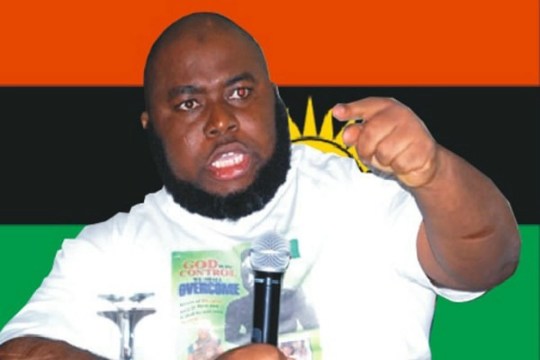
View On WordPress
0 notes
Text
Why We Don’t Want Middle Belt In Biafra – BNL
New Post has been published on https://thebiafrastar.com/why-we-dont-want-middle-belt-in-biafra-bnl/
Why We Don’t Want Middle Belt In Biafra – BNL

The Biafra Nations League (BNL) has given reasons why Igala and the whole Middle Belt ought not be remembered for the guide of Biafra.
(adsbygoogle = window.adsbygoogle || []).push();
Review that the Chairman of the Igala Cultural Development Association (ICDA) working panel, Comrade Enemona Omattah had expressed that the Igala clan won’t be essential for Biafra.
Omattah approached the banned Indigenous People of Biafra (IPOB) to forget about the Igalas of any arrangement to withdraw from Nigeria. He spread the word about this for newsmen in Lokoja on Monday.
He said: “We are not piece of their disturbance. IPOB and Biafra can’t add-on Igala country. We are approaching Igbo individuals to quit incorporating Igala land in their guide.”
(adsbygoogle = window.adsbygoogle || []).push();
“During the Nigerian Civil War, Emeka Ojukwu-drove group bombarded Igala land. Our territory was really assaulted. Individuals that assaulted us years prior can’t come around now and guarantee we are essential for them. We are not piece of Biafra. We won’t ever be essential for Biafra. In spite of the fact that we work with them and even intermarry, that doesn’t mean we are essential for them.”
(adsbygoogle = window.adsbygoogle || []).push();
“We put stock in the Nigeria Project. We have confidence in the initiative of Nigeria country. We have our issues with the Nigeria country yet we are not adversarial. We will resolve our issues at the proper time, not via conveying firearms and battling. We trust in the corporate presence of Nigeria.This is the situation of Igala country.”
Responding in an explanation together endorsed by BNL National Leader, Princewill Chimezie Richard; Deputy National Leade and Head of Operations, BBs Media, Ebuta Akor Takon and BNL Chief of General Staff, Linus Essien, the gathering demanded that the Middle Belt may be added to Biafra in the event that they demonstrate revenue to be important for it.
BNL noticed that the Middle Belt assumed a significant part in seing to the loss of Biafra during the conflict.
(adsbygoogle = window.adsbygoogle || []).push();
“The 1967 guide which was acclimated to incorporate Delta State stays bona fide. The district of Biafra are individuals who shares a typical history and social legacy and not the individuals who because of limit impact acquired not many culture of the Igbo in Northern Enugu, Anambra and Ebonyi,” the gathering said.
“It Is against the overall interest of Biafra to be hauling the individuals who battled on Nigeria side as mafians. The Fulani and Hausa were not really individuals who battled during the conflict.
(adsbygoogle = window.adsbygoogle || []).push();
The gathering accused other genius Biafra bunches for neglecting to connect with different spaces of the Eastern Region to illuminate them about the battle however hauling center belt, adding “We will avoid the battle for extension”.
0 notes
Text

THE ORIGIN/HISTORY OF IKWERRE PEOPLE:
The Ikwerre (natively known as Iwhuruọha are one of the Igbo Subgroups in Rivers State. Traditional history has classified Ikwerre into seven groups called "Ikwerre Essa". They are Elele, Isiokpo, Rumuji, Emohua, Choba, Aluu Igwuruta and Obio group. This division was recognized by Forde and Jones; (1950) in their ethnographic study of the Igbo speaking peoples of South Eastern Nigeria
Some Ikwerre people migrated from Ika a subgroup of Igbos in Delta State and Edo state while some migrated from Ngwa, Arochukwu and Ohaji/Egbema.
The Aro first came into the Ikwerre area through Ozuzu-Etche, settling at Isiokpo, Igwuruta, Omagwa, etc. As expected of pre-literate African societies, the history of the people is wrapped in myth and mystery. This presupposes that historians may have to resort to oral tradition for the justifiable/credible reconstruction of the people's history. From the post-colonial dispensation to the present, professional historians and other personals have attempted to reconstruct the history of the people. For instance, the works of Elechi Amadi, especially The Concubine, The Great Ponds, The Slave (novels) and Isiburu (a verse play) are a literary attempt at reconstructing a semblance of the Ikwerre society in the pre-colonial era.
When Port Harcourt was conquered by Nigeria during the Biafran War and the Igbo people from other parts of Igboland fled the territory, a UN report says that the Ikwerre decided to claim that the Ikwerre were non-Igbo for convenience. The Ikwerre are recognized officially as a separate group in the 1979 Nigerian Constitution.
It was about that time that names of places and those of some individuals began to change to reflect a new era in the Ikwerre history. Examples are:
Umu changed to Rumu,
Mu na chi changed to Manuchi,
Nwike changed to Wike,
ObiAkpo changed to ObiakpO,
Chidimma changed to Chiburuoma,
Nwa changed to Nwo.
Ezenwa changed to Ezenwo.
Nwakpa/Nwekpa changed to Wekpa etc.
Meanwhile, from Elechi Amadi, in his earlier narrative related that before these repudiatons a community called Chiolu had a king known as "Eze Diala" and another community had a king called "Eze Okehi". All these names were Igbo, not any other nation.
"The Ikwerre of the present Rivers State were made to underline this point after the collapse of Biafra by the simple process of prefixing a capital "R” to the names of their towns. In this way. Ụmụkurushi became Rumukurushi, Ụmụigbo became Rumuigbo and so on in the hope, rather than the belief, that this would make other Nigerians forget they are or ever were Igbo.
#african#afrakan#kemetic dreams#africans#brownskin#afrakans#brown skin#african culture#afrakan spirituality#igbo#ikwerre#west africa#chiolu#eze#eze okehi#elechi amadi#rumuigbo#nwakpa#nwekpa#wekpa#nwo#nwa#chiburuoma#chidimma#obiaikpo#wike
17 notes
·
View notes
Text

The Igbo people of Nigeria!!
The Igbo people (English: / EE-boh, also spelled Ibo ,natively Ṇ́dị́ Ìgbò) are an ethnic group in Nigeria. They are primarily found in Abia, Anambra, Ebonyi, Enugu, and Imo States. A sizable Igbo population is also found in Delta and Rivers States.Large ethnic Igbo populations are found in Cameroon,Gabon, and Equatorial Guinea,as well as outside Africa. There has been much speculation about the origins of the Igbo people,which are largely unknown.Geographically, the Igbo homeland is divided into two unequal sections by the Niger River—an eastern (which is the larger of the two) and a western section.The Igbo people are one of the largest ethnic Groups in Africa!!
PS: Subscribe to our Group YouTube Channel
and find More Interesting Stories of Africa 👇
https://youtu.be/j1NiFuZWYCs
https://youtu.be/j1NiFuZWYCs
#Galdeediaries Cc Mighty African History
15 notes
·
View notes
Quote
The Ijebu are best described as a federation of states (Isichei 1983:134) combining a divine king (Awujale) with a more decentralized form of government. The Awujale, who is based in the town of Ijebu-Ode, rules over a series of lesser crowned rulers located in towns such as Ijebu-Ife, Ijebu-Remo, Ijebu-Imushin, and Ijebu-Igbo. The latter are expected to honor and serve the Awujale at the same time that they exercise some degree of autonomous rule over chiefs and others below them. A separate but not unrelated system of rule is the judiciary society called Oshugbo by the Ijebu and Egba Yoruba (and Ogboni by other Yoruba subgroups); it is made up of male and female elders who oversee court cases at various levels, decide the punishment of criminals who have been condemned to death, and tend to all affairs concerning the king from the time he is selected and installed to his burial (Drewal, Pemberton, & Abiodun 1989:136). The present ruling kingdom was said to have been founded in the late fourteenth century when, according to myth, Obanta, son of the god Oduduwa, was sent from Ile-Ife to reign as Awujale of the Ijebu nation. In the process, he encountered and subsequently conquered several indigenous groups including the Idoko, a name that still identifies the people in one Ijebu district and which has some bearing on the history of weaving in the area. Later migrations from Benin and Ondo added rich layers of culture to the Ijebu area. Yet other influences came by way of the Ijo of the Niger Delta, from whom the Ijebu adopted cultural traditions including their water-spirit masquerades
Lisa Aronson, Ijebu Yoruba "Aso Olona": A Contextual and Historical Overview.
5 notes
·
View notes
Text
Ụ́kpụ́rụ́: BHM Guide
BHM Topics Centring on Igbo History and Culture.
Lejja: 4000 Year Old Iron Smelting Site
Tag: #metallurgy | #metalwork
Archaeological investigations at the prehistoric iron smelting site of Lejja, Nigeria, made possible the study of some large scale iron smelting debris – evidence of a once thriving iron smelting community. The main village square in Lejja, contains over 800 slag blocks weighing between 34 and 57 kg. Furnaces, tuyères and slag are visible on the surface in many places. The site has been radiocarbon dated to approximately 2000 BC. [more+]
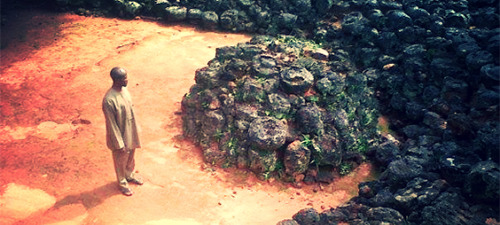
Lejja village square [+]
Igbo Ukwu
Tag: #igbo ukwu
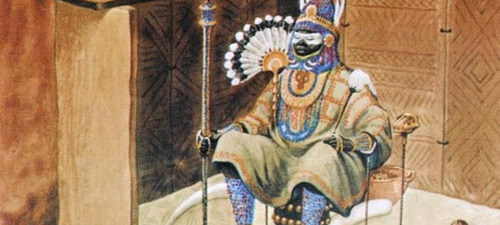
9th century nobleman’s tomb [+]
It is possible that the inhabitants of Igbo-Ukwu had a metalworking art that flourished as early as the ninth century (though this date remains controversial). Three sites have been excavated, revealing hundreds of ritual vessels and regalia castings of bronze or leaded bronze that are among the most inventive and technically accomplished bronzes ever made.
— Met Museum [more+]
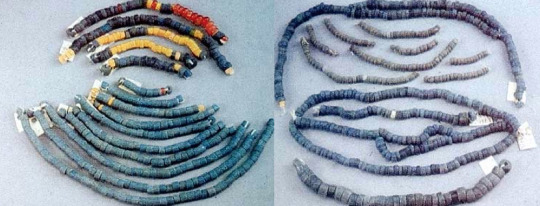
More than 165,000 beads of Indian, (medieval) Egyptian, and Venetian/Mediterranean origin points to trans-Saharan trade reaching the Lower Niger in the 9th century. [+]

The coast is 100 miles away from Igbo Ukwu, the presence of a bronze in the shape of a triton shell suggests a sea trade in the Niger Delta area was significant in the 9th century. [+]
>> Some of the oldest fibres of textiles found in western Africa [+]
>> Eri and Nri, Founders of Nri c. 10th century, associated with Igbo Ukwu
Nsibidi: Pre-15th century Ideographic Writing
Tag: #nsibidi
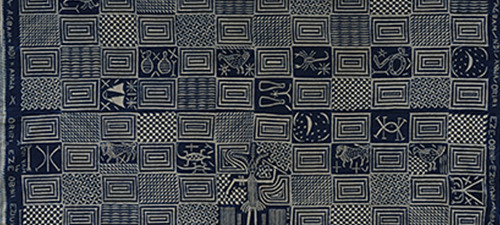
Ukara Nsibidi cloth [+]
Nsibidi is an ancient system of graphic communication indigenous to the Ejagham peoples of southeastern Nigeria and southwestern Cameroon in the Cross River region. It is also used by neighboring Ibibio, Efik and Igbo peoples. Aesthetically compelling and encoded, nsibidi does not correspond to any one spoken language. It is an ideographic script whose symbols refer to abstract concepts, actions or things and whose use facilitates communication among peoples speaking different languages.
— Smithsonian [more+]
>> Jean-Michel Basquiat and Nsibidi [+]
Old Calabar, Bonny and the Slave Trade
Tag: #slavery
The slave trade in the area known as Bight of Biafra (today eastern Nigeria and southern Cameroon) was very significant, millions of people were taken captive in this area and taken to the Americas by Europeans.
The Trade
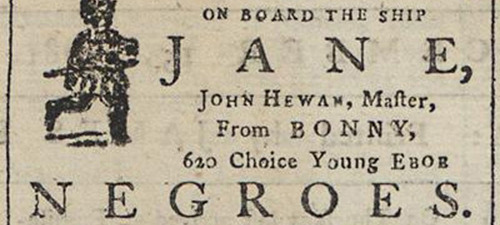
620 enslaved Igbo from Bonny to Montego Bay, Jamaica [+]
>> Port of Bonny
>> Igbo Names on the Amelié, 19th Century Slave Ship, Martinique
>> European Items Traded with Africans in exchange for Captives
>> The Interesting Narrative of the Life of Olaudah Equiano
>> Nancy Daniels survived the Atlantic Crossing
Resistance
>> African Resistance from the Shore and Slave Ship Captures by Africans
>> Ibo Landing, Geogria – Tag: Ibo Landing
>> Bussa’s Rebellion, Barbados – [+] | [+]
>> Igbo Runways in Virginia
>> Monday Gell and the Denmark Vesey Case – [+] | [+]
>> Eboe Rebellion, Jamaica
The Trans-Atlantic Link
Tag: #The Invisible Atlantic Cord
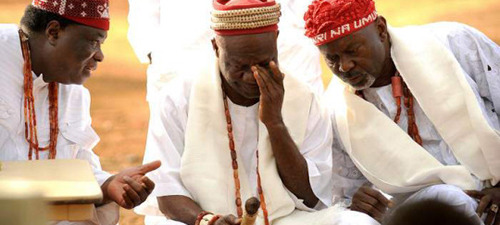
Eze Nri memorial of the enslaved, Virginia [+]
>> West Indian Igbo Words >> Igbo-West Indian Folk Idioms
>> Afro-Virginian Art and the Bight of Biafra >> Awka Metallurgy in America
>> US descendants >> Diaspora Igbo
>> Jaja of Opobo in Barbados
>> Ibo Granmoun: The Roots of Haitian Democracy >> The Igbo in Haiti
>> Eze A. Ogueri II: An African in British Guiana
Colonial Resistance
>> The Story of King Jaja of Opobo (1821-1891)
vimeo
>> The Ekumeku Movement – Tag: #ekumeku
>> Anglo-Aro War – Tag: #anglo-aro war

Re-enactment of the women’s protest, 60th Anniversary of the Women’s War of 1929 [+]
>> Women’s War of 1929
>> Iva Valley Massacre at Enugu – [+] | [+]
Other
| >> Indigenous Technology and Colonialisms Effects
| >> Impact of Indigenous Beliefs about Sacred Animals in the Niger Delta and Cross River area on Wildlife protection
| Folk tales: Asele, The Legendary Designer | Okpangu, The Ape Man | Goddess Idemili | Nza The Smart
| Other tags: #bio | #books | #art | #architecture | #women | #spirituality | #biafra
190 notes
·
View notes
Text
The Misfortune of a Divided Igboland
As anybody who has studied the history of the people of the oil-rich Niger Delta and of its Igboland component would know, all the foreign people who have come across the Igbos have reported their ingenuity, their industriousness, innovation, charity to all as well as their “can-do” spirits. When the utter undermining and underdoing of […]
The post The Misfortune of a Divided Igboland appeared first on The Leader Newspaper Online.
from WordPress https://theleaderassumpta.com/the-misfortune-of-a-divided-igboland/?utm_source=rss&utm_medium=rss&utm_campaign=the-misfortune-of-a-divided-igboland
0 notes
Text
Check out New Post published on Ọmọ Oòduà
New Post has been published on http://ooduarere.com/naija-gist/metro-life/2nd-niger-bridge-not-igbo/
The Second Niger Bridge Is Not Igbo Bridge
I have said this before in this column and would like to repeat it; the Second Niger Bridge is not an Igbo Bridge. The South-East cannot claim ownership of the bridge more than Delta and Edo states. Just as the First Niger Bridge did not belong to the Igbo, the Second Niger Bridge can’t. The First Niger Bridge was built to connect the defunct Eastern and Western regions. Neither the Eastern nor Western region laid claim to the bridge.
Similarly, the people of Onitsha don’t own the bridge more than the people of Asaba. Anambra and Delta states are two equally gateway states on the eastern and western flanks of the bridge. As far as the bridge is concerned, the two are equal.
I have never heard or read of politicians/stakeholders in Delta and Edo states laying claim to the bridge as those in the South-East have been doing. The misguided insinuations about the bridge being of more value to the South-East should stop if the people really want the bridge to be completed, otherwise, the powers that be might decide to abandon it if it and nothing will happen.
My comments are a reaction to the recent claim by the Chairman of South-East Governor’s Forum and Governor of Ebonyi State, Dave Umahi, who, over the weekend, reportedly described the pace of work so far recorded by the Federal Government on the Second Niger Bridge as a major achievement for the South-East geopolitical zone.
This is absolutely uncalled for. How is the work done so far by the Federal Government on the bridge a major achievement for the South East and not for the South-South and South-West that are part and parcel of the bridge? How could the South-East claim whatever achievement that has been recorded on the bridge alone without the other zones in the loop?
It bothers me that leaders who ought to be measured in their remarks express flippant talks just for political gratification. President Buhari is not asking for praise because there is not yet any major achievement on the bridge until it is completed. Pillars and cross beams under construction are not the bridge. It is the completion of the bridge that would constitute what may then be called a major achievement. We are hoping that the bridge will be completed and not abandoned. Until then, it is better for politicians to hold their peace.
What the elite should do is to help sort out any encumbrances delaying the work. Something like the court cases pitching the Federal Ministry of Works and Housing with the host communities should be sorted out for the work to continue unhindered.
Work on the bridge began in May, 2015. Ever since then, the rumour mill has been awash with all kinds of speculations. The South-East zone appears to be the most agitated. I would like to stress that the Second Niger Bridge is not an Igbo project. A bridge that equally bestrides Anambra State at Onitsha and Delta State at Asaba cannot belong to the Igbo alone. I, therefore, can’t understand why only the Igbo appear to be too forward about the bridge. Everybody should be calm and stop politicizing the bridge that would, in other climes, go unannounced until it is completed.
For example, last year 2018 October, the Chinese President Xi Jinping, officially opened the world’s longest sea crossing bridge measuring 55 kilometres with its access roads. Nobody heard about it while it was under construction.
But in our own case, not long ago, while the Ohaneze Ndigbo, reportedly warned President Muhammadu Buhari not to stop work on the Second Niger Bridge, the Aka Ikenga also issued a statement condemning the cessation of work on the bridge. Earlier on, the Ohaneze Caretaker Committee lamented that former President Goodluck Jonathan “lied to Ndigbo about awarding a contract for the construction of the Second Niger Bridge. There is no need for all this hysteria from the Igbo.
My fear is that these statements could derail the bridge project rather than enhance it. An attempt to establish the truth led me to investigate the bridge project. The truth is that the bridge does not serve the South-East more than it serves the South-South and South-West that have direct links to it. I am afraid that if this bridge is branded an Igbo project, it would be treated like everything Igbo. The bridge should be left to the Federal Government and the international investors to realise the project.
The first Onitsha-Asaba Niger Bridge was completed in December 1965. Built by the French construction giant Dumez, the bridge linked the defunct Eastern and Western regions of Nigeria. Today, it is the major corridor of trade between the South-East, South- South, South-West and North-Central zones. At the time the bridge was conceived, Nigeria was mainly an agrarian economy. Thus, the bridge served as the avenue for transporting different agricultural products – palm produce, timber, rubber, etc. Prior to the construction of the bridge, these commodities were ferried across the River Niger between Onitsha and Asaba using canoes.
Owing to rapid economic development and population growth, pressure began to mount on the bridge, especially during festive periods. The bridge has been overstretched beyond its capacity. There is apprehension that it might collapse with catastrophic consequences to lives and properties. To forestall such disaster, the idea of a Second Niger Bridge was conceived.
The Second Niger Bridge was on the drawing board for many decades. Successive administrations in the country paid lip service to its construction. It was President Goodluck Jonathan that finally flagged off the construction of the bridge and actual work started. To that extent, it is wrong to accuse Jonathan of lying to Ndigbo about the bridge. Jonathan thought that he would win a second term during which he would complete the bridge. But he lost the election. The history of the bridge cannot be written without mentioning Goodluck Jonathan.
According to information, the project, which is divided into three phases, will bypass Onitsha and Asaba to connect the Owerri-Onitsha Expressway at Nkwerre-Ezunaka, and then cross Atani to the Asaba-Benin Expressway at Okpanam with a total length of 44 km. With this length, the Second Niger Bridge will be competing with the world’s longest bridge in China (55 km)!
The project is being constructed under a Public Private Partnership (PPP) scheme. A Consortium, JB-NSIA, is working on the project on the basis of Design, Build, Finance, Operate and Transfer (DBFOT), at a total cost of N108 billion. The initial cost estimates may have risen owing to inflation. The Bureau of Public Procurement (BPP), reviewed the concessionaire’s cost of N138 billion down to N108 billion.
The project phases will be constructed under Engineering, Procurement & Construction contracts awarded by the Federal Ministry of Works (FMW). The Federal Government committed to contribute N30 billion (28%) of the project cost. The remaining 72% will be raised by the Consortium under a 25-year concession. The Federal Government has so far committed N18.31billion as at 2015. Out of this, N10.4 billion has been disbursed leaving a balance of N7.94 billion.
A team of local and international consultants was engaged through a rigorous and competitive procurement process. The NSIA has spent the sum of $2.21 million on consultancy and another $247,586 on due diligence to determine project viability. The first-class advisory services are required to enable the project reach financial close – the point at which private capital is successfully raised.
Work on the bridge slowed down some time ago because of the rainy season that naturally stalls engineering construction work. Preliminary physical works have been completed. The Environmental and Social Impact Assessment (ESIA), is being done to meet the highest international standards to make the project eligible for long-term financing by local and international financial institutions. The Infrastructure Concession Regulatory Commission (ICRC) is reviewing the Full Business Case (FBC), and Draft Concession Agreement (CA). Once the ICRC approves the FBC, the CA will be signed and the Consortium will then raise the remainder of the project capital. On the strength of this, recent insinuations that the bridge may not meet highest standard is unproven.
It is in the country’s interest to hold onto this project because any review will definitely raise the cost owing to the depreciation of the naira. The cost of the project was reached at the exchange rate of N154/$. Now the naira exchanges at N350/$. No doubt, Nigerians want to see a second bridge across the River Niger. People should calm down. The bridge project has a development and completion time-frame of 4 years from financial close – point at which private capital is successfully raised. Soon, the countdown for the bridge will start for good if the Federal Government did not waver on this critical Nigerian project.
guardian.ng
0 notes
Text
'Ijaw is Biafra,Not Niger-Delta,Not South-South'--Ijaw Man Replies Annkio Briggs
New Post has been published on https://thebiafrastar.com/ijaw-is-biafranot-niger-deltanot-south-south-ijaw-man-replies-annkio-briggs/
'Ijaw is Biafra,Not Niger-Delta,Not South-South'--Ijaw Man Replies Annkio Briggs

My name is Engr Keribo Minakobiribo. I’m from Buguma in Tom-Geroge compound but I grew up in Tombia Kingdom. The essence of disclosing my identity is to prove to Mr Asari Dokubo of Buguma, and Mrs Annikio Briggs of Abonnema, that I also, am a son of ijaw land. Once, I was tender but like the saying goes that “the young shall grow,” I must speak and defend my region in its true identity as given by the Opu Tamuno in heaven and not the ways of the British foreigners and the invading Fulanis.
(adsbygoogle = window.adsbygoogle || []).push();
My respected brother and sister of ijaw nation, it appears to me that you and others like you want to continue to keep us in the WILL of the strangers of our land that our ancestors knew nothing about. Mr Asari Dokubo once postulated that Ijaw are more Biafran than others in the Biafran enclave, and we believed him.
Madam Annikio agreed with him because during the days of his agitation for the Biafra National Council, you never came up to refute him in that regard. You never agreed that Abonnema that is in Ijaw is more of Niger Delta than Biafra but one thing led to another and Mr Asari is on his own out of the scene. Then Nnamdi Kanu came barely some days ago to enlighten humanity with many historical facts and figures why we are more Biafra than Niger Delta then you came up with your refutals and criticisms capable of causing confusion among the young generation of Ijaw that Abonnema is not Biafra.
(adsbygoogle = window.adsbygoogle || []).push();
Madam, I, Engr Keribo totally disagree with you, and insist that Ijaw is Biafra and not Niger Delta. In like manner, Abonnema is Biafra, and not Niger Delta. Recall that the Bight of Biafra has been in existence all the way since 1525 to the middle of the 18th century when Bonny emerged as the leading slave trading port in the Bight of Biafra, thus out-pacing the earlier dominant slave ports of Elem Kalabari also known as New calabar. In 1881 Bakana was founded, 1882 Abonnema was founded, 1884 Buguma was founded, and Tombia was founded in 1885 at its present settlement. The Okirikas were existing since the 17th century.
(adsbygoogle = window.adsbygoogle || []).push();
I mentioned but just few, and according to history, the king of Britain in 1875 (even far into 1914 amalgamation of the North and South) sent his representative as a Consul and the Kings and Chiefs signed an agreement and we were then known as Biafra. So, how come today that we don’t bear our ancestral identity again, rather, that which the same Britain foisted on us having seen the potency of our unity with our Igbo brothers? They gave us that insulting name Niger Delta. Not only that they also taught the Fulani how sustain the injury and the evil divide -and -rule strategy. In May 27, 1965, Rivers State was created to cause division among us.
(adsbygoogle = window.adsbygoogle || []).push();
They called us Port Harcourt (the name of a man who was a sexual pervert). As if that were not enough, they added Niger Delta garbage. What an insult to the memory of our great ancestors! I might be a small boy in your sight but as long as breath runs in my nostrils I will not allow myself to be labeled by the same foreigners that hate me. I am an ijaw and I am a Biafran that God the creator made my ancestors to be which they passed unto me. I don’t know when the conference took place but it is the deliberate effort of Mr Willink of Britain to divide and weaken the potency of our unity with our Igbo brothers who share same cultural heritage with us. Madam, Annikio, do you tie two pieces of wrapper on most important cultural or traditional outings? If yes, so are the igbo and the rest of them in the Biafra enclave. So how come you are saying we are not one people?
(adsbygoogle = window.adsbygoogle || []).push();
Fulani are occupying our territories in our fishing ponds and riverine areas and in our mangrove swamps with strategies to fulfil the ancient agenda of ‘dipping the Koran in the Atlantic Ocean’ to facilitate the final conquest, and you didn’t say anything in that regard rather, you easily come on social media to refute and make nonsense of all the verifiable geographical and historical facts and figures that Mazi Nnamdi Kanu makes to shame our oppressors. Madam, your elders are doing this generation great disservice by obstructing historical evidence of who we are as a people. Madam Briggs, we are both from Ijaw despite that I’m from Buguma but if I come to your compound today in Abonnema and say that you are no more Annikio Briggs but ‘Aisha’, how will you feel? Won’t you do something to change the imposed name ‘Aisha’, and revert to your proper identity?
(adsbygoogle = window.adsbygoogle || []).push();
Well, despite whatever your reaction may be, as for me, I am a Biafran. Whether Tombia or Buguma, we are older than that garbage – Niger Delta – given to us by our enemies. Madam, in what has happened so far with the Ogoni Clean -Up project , will you say that justice has been done to the memory of Major Adaka Boro, and the Ogoni 9? What about the underdevelopment being witnessed even right in the heart of Abonnema while the Fulani are in far away North sucking our oil to better their lots?
(adsbygoogle = window.adsbygoogle || []).push();
Gov. Nyesom Wike is today battling alone with the Fulani that are coming in their droves to take over our land, what have you said or done so far to show solidarity with him? I found nothing concrete of your efforts in that regard not even on your facebook wall but you easily find it pleasurable to attack Nnamdi Kanu. Madam, with all due respect to your personality, it is too bad that you could allow this hypocrisy to continue to exist till this day. Madam, may I remind you that Mr Frank Opigo who was once a Principal in Okirika Grammar School, is from Bayelsa State. Before the Ahiara declaration of Biafra, the Old Eastern Consultative Assembly members came together to meet over the name the new republic would bear, then Mr Frank Opigo reminded Gen. Ojukwu that “we are all Biafrans”, and that was how they adopted that name again.
(adsbygoogle = window.adsbygoogle || []).push();
Now if you accept Bayelsa where Mr Frank came from as Ijaw then why is Abonnema of Rivers State not Biafra? Meanwhile Bayelsa was carved out from Rivers State just few years ago. Madam, the ancestors of Bakana Buguma and Abonnema once settled in one location in the 17-18th century before they separated for their present settlements. So, are you saying now that Mr Asari Dokubo was wrong when he said “Ijaw is more Biafra than any other tribes?” Moreover, madam, what is absolutely wrong if we fight together and Ijaw become a confederated region in Biafra nation? Isn’t that safer for our region than living with the oppressors in Nigeria🇳🇬? Tamuno bless Ijaw, Tamuno bless #Mazi_Nnamdi_Kanu, Tamuno bless #BIAFRA.
Written by Engr Keribo Minakobiribo Wisdom aka DODORIMA BIAFRA (Izon man).

(adsbygoogle = window.adsbygoogle || []).push();
#FreeBiafra #Biafra52 #BiafraHeroesDay2020 #SNNBIAFRA
0 notes